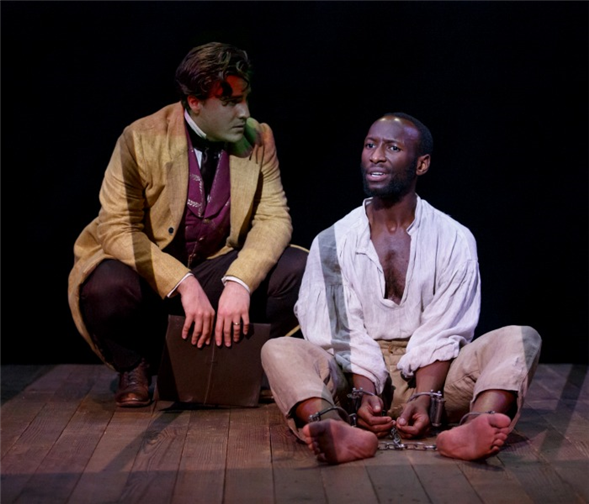Translate Page

A new play imagines the rebellious leader's final hours
---
Nathan Alan Davis doesn't recall when he first heard about Nat Turner, the slave preacher who led a bloody uprising in Virginia in 1831. But he does recall his reaction when he read The Confessions of Nat Turner, an account of the revolt that a white lawyer named Thomas R. Gray claimed to base on jailhouse interviews with Turner after he was captured.
"I was really moved by the language of the document -- by the really heightened poetic, spiritual, mystical aspects of the language, and by Nat Turner's absolute conviction, even as he was facing death," Davis says. "It touched on a lot of the things that excite me artistically in terms of both content and language."
Soon enough, he was writing a play, which he began during a fellowship at New York Theatre Workshop. The result, which NYTW is currently producing, is Nat Turner in Jerusalem, a two-hander set on the night before Turner's execution. The title simultaneously evokes Jerusalem, Virginia, where Turner was executed, and the Biblical city where Christ was crucified.
Davis joins a rich lineage of artists who have tackled Turner's story, including everyone from rappers to painters to poets. In just a few weeks, in fact, the Turner canon will get another major entry with Nate Parker's film The Birth of a Nation, which follows Turner from childhood to death. It is considered a contender for several Academy Awards, including Best Picture.
{Image1}
As prevalent as it is, however, art about Nat Turner often inspires controversy. Many complained that William Styron's Pulitzer Prize-winning 1967 novel, also called The Confessions of Nat Turner, depicted Turner as a madman. Meanwhile, some are threatening to boycott Parker's movie because of allegations that he participated in the rape of a female schoolmate when he was in college. And some scholars have even argued that Gray fabricated, or at least heavily edited, the original Confessions.
Davis is aware of all the claims and charges, but because the original document spoke so strongly to him, he has remained determined to share his interpretation. "It's a story that a lot of people have a personal investment in," he says. "But part of the struggle, and part of the excitement, is I can look at those words and I can look into the history and come up with something new."
From the beginning, he decided against depicting Turner's confession to Gray. "That would have led the play more in the direction of a history lesson," he says.
Instead, the famous manuscript is largely finished when the play opens, and its collaborators are meeting for the last time. "The idea of setting it on the night before Nat's execution was an opportunity to look more into the essence of what the interaction between them might have been," Davis says.
The Turner he imagines, played with quiet intensity by Phillip James Brannon, is smart, funny, dedicated to his cause, and committed to his faith. He spends his final hours attempting to save Gray's soul.
"Even as he's facing death, he evinces complete faith, and that was fascinating to me, how you hold on to that," says Davis, who grew up in the Bahá'í faith, which emphasizes personal reflection and service to humanity. He adds that the idea that there is an afterlife and "having a belief based on that as a way to inspire you to live in this world is something that I feel for me is very important. And I think that for Nat Turner that was important as well."
Davis began working on Nat Turner in Jerusalem as the Black Lives Matter movement spread across the country, and he sees parallels between Turner's crusade and the current one. "People who really put their lives on the line for justice, and people who commit themselves to activism, shape our reality in a very concrete way," he says. "The play wouldn't be the play it is without the world being the world that it is."
---
TDF members: At press time, discount tickets were available for Nat Turner in Jerusalem. Go here to browse our latest offers.
Photos by Joan Marcus. Top image: Rowan Vickers and Phillip James Brannon
Follow Janice C. Simpson at @BroadwayAndMe. Follow TDF at @TDFNYC.